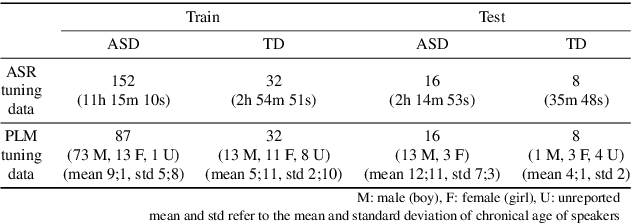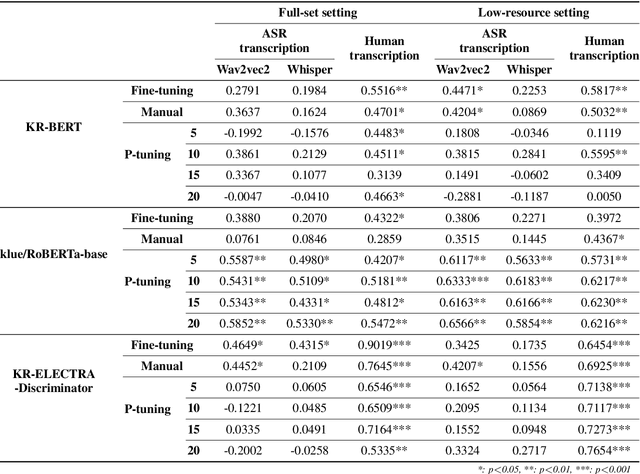Jihyun Mun
Developing an End-to-End Framework for Predicting the Social Communication Severity Scores of Children with Autism Spectrum Disorder
Aug 30, 2024


Abstract:Autism Spectrum Disorder (ASD) is a lifelong condition that significantly influencing an individual's communication abilities and their social interactions. Early diagnosis and intervention are critical due to the profound impact of ASD's characteristic behaviors on foundational developmental stages. However, limitations of standardized diagnostic tools necessitate the development of objective and precise diagnostic methodologies. This paper proposes an end-to-end framework for automatically predicting the social communication severity of children with ASD from raw speech data. This framework incorporates an automatic speech recognition model, fine-tuned with speech data from children with ASD, followed by the application of fine-tuned pre-trained language models to generate a final prediction score. Achieving a Pearson Correlation Coefficient of 0.6566 with human-rated scores, the proposed method showcases its potential as an accessible and objective tool for the assessment of ASD.
Speech Corpus for Korean Children with Autism Spectrum Disorder: Towards Automatic Assessment Systems
Feb 23, 2024



Abstract:Despite the growing demand for digital therapeutics for children with Autism Spectrum Disorder (ASD), there is currently no speech corpus available for Korean children with ASD. This paper introduces a speech corpus specifically designed for Korean children with ASD, aiming to advance speech technologies such as pronunciation and severity evaluation. Speech recordings from speech and language evaluation sessions were transcribed, and annotated for articulatory and linguistic characteristics. Three speech and language pathologists rated these recordings for social communication severity (SCS) and pronunciation proficiency (PP) using a 3-point Likert scale. The total number of participants will be 300 for children with ASD and 50 for typically developing (TD) children. The paper also analyzes acoustic and linguistic features extracted from speech data collected and completed for annotation from 73 children with ASD and 9 TD children to investigate the characteristics of children with ASD and identify significant features that correlate with the clinical scores. The results reveal some speech and linguistic characteristics in children with ASD that differ from those in TD children or another subgroup of ASD categorized by clinical scores, demonstrating the potential for developing automatic assessment systems for SCS and PP.
A speech corpus for chronic kidney disease
Nov 03, 2022



Abstract:In this study, we present a speech corpus of patients with chronic kidney disease (CKD) that will be used for research on pathological voice analysis, automatic illness identification, and severity prediction. This paper introduces the steps involved in creating this corpus, including the choice of speech-related parameters and speech lists as well as the recording technique. The speakers in this corpus, 289 CKD patients with varying degrees of severity who were categorized based on estimated glomerular filtration rate (eGFR), delivered sustained vowels, sentence, and paragraph stimuli. This study compared and analyzed the voice characteristics of CKD patients with those of the control group; the results revealed differences in voice quality, phoneme-level pronunciation, prosody, glottal source, and aerodynamic parameters.
 Add to Chrome
Add to Chrome Add to Firefox
Add to Firefox Add to Edge
Add to Edge